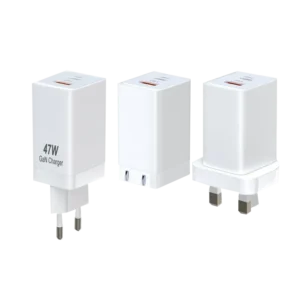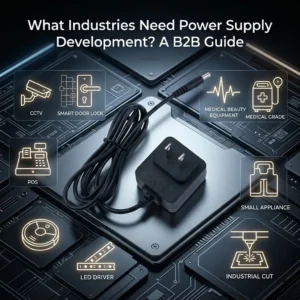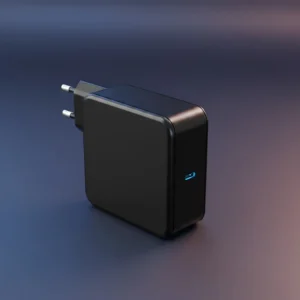Garantizar energía confiable para dispositivos modernos
En el acelerado mundo digital de hoy, el cargador USB-C se ha convertido en un elemento esencial de uso diario: alimenta todo, desde teléfonos inteligentes hasta computadoras portátiles.
Antes de que un nuevo cargador USB-C llegue a tus manos, se somete a un proceso crítico llamado prueba EVT (prueba de verificación de ingeniería).
Esta etapa de validación temprana garantiza que cada adaptador de corriente de carga rápida de GaN sea seguro, eficiente y esté listo para su uso en el mundo real.
🔌 1. ¿Qué es la prueba EVT?
La EVT (prueba de verificación de ingeniería) es el primer punto de control importante en el desarrollo del producto, generalmente seguido de:
EVT → TVP → TVP → MP
(Ingeniería → Diseño → Producción → Producción en masa)
Durante la prueba EVT, los ingenieros verifican si el diseño del circuito del bloque de carga USB-C cumple con todos los requisitos de rendimiento y seguridad.
Es la etapa donde se prueban exhaustivamente la entrega de potencia, el control de temperatura y los mecanismos de protección.
⚙️ 2. ¿Qué sucede durante la prueba EVT?
Para un adaptador de corriente USB-C o un cargador PD multipuerto, las pruebas EVT se centran tanto en la confiabilidad eléctrica como en la seguridad del usuario.
| Tipo de prueba | Objetivo |
|---|---|
| Rendimiento eléctrico | Mide voltaje, corriente, eficiencia y ondulación de salida en los puertos USB-C y USB-A. |
| Control térmico y de calor GaN | Evalúa la disipación de calor y el aumento de temperatura, especialmente importante para cargadores compactos con tecnología GaN. |
| Verificación de seguridad | Pruebas de protección contra sobretensión, cortocircuito y alta tensión para evitar daños al dispositivo. |
| Compatibilidad de protocolos | Verifica la funcionalidad de entrega de potencia (PD), PPS y Qualcomm Quick Charge. |
| Pruebas mecánicas y estructurales | Garantiza que los enchufes plegables, la carcasa compacta y la alineación del puerto resistan el uso diario. |
| Prueba previa de EMC | Comprueba las emisiones electromagnéticas para prepararse para la certificación global. |
🔋 3. Por qué son importantes las pruebas EVT para los cargadores USB-C
Un bloque USB-C bien diseñado debe ofrecer una carga rápida y constante para dispositivos como iPhones, iPads, MacBooks y AirPods, y al mismo tiempo mantenerse fresco y compacto.
Omitir las pruebas EVT puede provocar problemas como sobrecalentamiento, salida inestable o falla de certificación.
Es por eso que los fabricantes profesionales siempre realizan EVT antes de la producción a gran escala.
⚡ 4. Ejemplo: Prueba EVT de un cargador USB-C GaN compacto de 3 puertos
Tomemos un ejemplo:
Un cargador compacto con dos puertos USB-C de 20 W y un puerto USB-A de 18 W, perfecto para viajar.
Durante las pruebas EVT, los ingenieros comprobarán:
-
Estabilidad de salida de 5 V a 20 V bajo carga completa
-
Rendimiento de carga rápida para teléfonos inteligentes y computadoras portátiles.
-
Temperatura de los componentes clave de GaN
-
Calificación de eficiencia superior a 90%
-
Protección contra sobrecorriente y cortocircuito
-
Durabilidad del enchufe plegable y compatibilidad con voltaje internacional.
🌱 5. Más que rendimiento: diseño ecológico
Los cargadores USB-C modernos no solo se centran en la eficiencia energética sino también en el diseño ecológico.
Las pruebas EVT ayudan a garantizar que la reducción de envases de plástico, los materiales reciclables y la tecnología GaN energéticamente eficiente cumplan con los estándares de seguridad y sostenibilidad.
Ya sea un adaptador de viaje o un cargador de escritorio para múltiples dispositivos, la validación EVT garantiza la calidad de adentro hacia afuera.
🧾 6. Salida de la prueba EVT
Después de las pruebas EVT, los fabricantes suelen entregar:
-
Un informe detallado de la prueba EVT
-
Datos de rendimiento eléctrico
-
Resultados de seguridad y validación del protocolo
-
Notas de mejora del diseño
Estos forman la base técnica para la etapa DVT (Prueba de verificación de diseño) y la certificación final.
🚀 7. Por qué la EVT marca la diferencia
Un cargador USB-C que pasa las pruebas EVT se destaca por:
✅ Entrega de potencia estable
✅ Gestión térmica confiable de GaN
✅ Compatibilidad multipuerto (USB-C y USB-A)
✅ Certificación de carga rápida (PD/QC)
✅ Mayor seguridad para cada dispositivo
Este proceso transforma un prototipo en un adaptador de corriente confiable y de alto rendimiento para usuarios de todo el mundo.
🏁 Conclusión
Desde un cargador GaN PD de 65 W hasta un asequible bloque de alimentación USB-C multipuerto, cada cargador exitoso comienza con rigurosas pruebas EVT.
Es la base de una carga rápida segura, eficiente y ecológica: la razón por la que su bloque USB-C funciona perfectamente cada vez que lo conecta.





